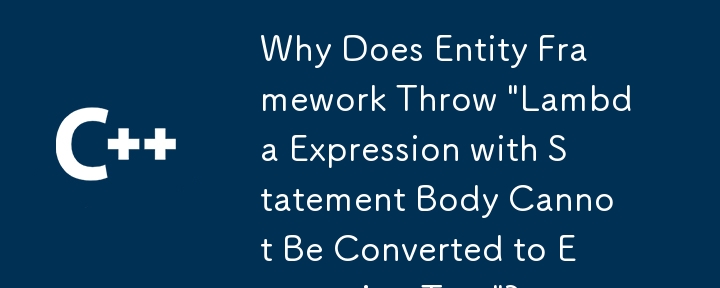Home >Backend Development >C++ >Why Does Entity Framework Throw 'Lambda Expression with Statement Body Cannot Be Converted to Expression Tree'?
Why Does Entity Framework Throw 'Lambda Expression with Statement Body Cannot Be Converted to Expression Tree'?
- Susan SarandonOriginal
- 2024-12-29 08:01:10278browse

Compiler Error: "Lambda Expression with Statement Body Cannot Be Converted to Expression Tree"
When working with EntityFramework, you may encounter an error stating, "A lambda expression with a statement body cannot be converted to an expression tree." This error occurs when you attempt to use a lambda expression with a block statement (also known as a statement lambda) in a context where only expression lambdas are allowed.
The Issue
As the error message suggests, EntityFramework expects expression lambdas, which are concise expressions without any block statements. In the example provided, the lambda expression:
Obj[] myArray = objects.Select(o =>
{
var someLocalVar = o.someVar;
return new Obj() {
Var1 = someLocalVar,
Var2 = o.var2 };
});
contains a block statement, making it a statement lambda. EntityFramework cannot convert this expression to a form suitable for executing database queries.
The Solution
To resolve the error, refactor your lambda expression to use an expression lambda. Expression lambdas are one-line expressions that directly return a value without using any additional statements. In this case, you can rewrite the lambda as follows:
Obj[] myArray = objects.Select(o => new Obj() {
Var1 = o.someVar,
Var2 = o.var2
});
This expression lambda eliminates the block statement and directly returns a new Obj object. This form is compatible with EntityFramework's expectation of expression trees and will resolve the compilation error.
The above is the detailed content of Why Does Entity Framework Throw 'Lambda Expression with Statement Body Cannot Be Converted to Expression Tree'?. For more information, please follow other related articles on the PHP Chinese website!
Related articles
See more- How do function pointers work in C++?
- [Book Review] Beej&#s Guide to Network Programming
- Can Consteval Functions Legalize Function Parameters in Template Parameters Dependent on Function Arguments?
- Why Declare Private Virtual Methods in C ?
- **How can you use function objects to achieve the functionality of built-in operators in C ?**

